
What’s the Best Way to Do a UK Company Search?
Simone Autiero, 9 November 2023
A high-quality UK company search platform should give you big-picture information and the fine details you need to make informed decisions. As well as researching specific companies to contact, you need to be able to compare options, discover new possibilities, and see how each company fits into the broader economic ecosystem of your industry or local area.
You might be searching for companies to:
- Discover investment opportunities in the UK
- Find potential customers, clients, and partners to reach out to
- Do due diligence or risk assessment before an upcoming project
- Find out about the most influential people in your field
- Get a sense of the health of the local economy
Many blog posts out there will tell you that the best way to find this information is by searching the data held by the Companies House or the Financial Conduct Authority (FCA).
But although these registers let you search some interesting company information for free, their data can often be outdated, incomplete, and inaccurate. The Companies House website explicitly says it “does not verify the accuracy of information filed”, and actionable insights are difficult to come by in the reams of PDF and spreadsheet data these sites produce.
So, in this article, we’ll take you through the benefits of doing a UK company search a different way—through one of Beauhurst’s platforms, instead of a registry based solely on UK government data. We’ll introduce our advanced search filters, which allow you to find all kinds of company information—from financial history to patents, people, and new products.
Beauhurst’s data can be accessed through four customised products:
- BeauhurstImpact, for universities, councils, and local government
- BeauhurstInvest, for investors and accelerators
- BeauhurstAdvise, for financial and professional services
- BeauhurstSales, for sales teams and recruiters
Book a demo with us to find out what these platforms can do for you.
What to expect from a high-quality UK Company Search
Verified information about all UK companies
Some may argue that the service on a register like Gov.UK’s Companies House website gives you enough data. But—as we outlined in our post about the alternatives to Companies House—the data submitted to these registers lacks freshness and accuracy, and it doesn’t cover every active company in England, Wales, Scotland, or Northern Ireland.
There are only 5m companies on the database of Companies House (and some private company search platforms, such as Data Gardener, which rely primarily on Companies House data). This list of 5m companies includes legal entities and companies that have already been dissolved, so the list of active companies you could potentially reach out to is even shorter.
As well as lacking breadth, the data on these sites quickly become outdated. Active companies have nine months to submit their accounts. This can be a lifetime in the startup world. You’d miss key opportunities to get involved in early growth stages if you’re looking for investment opportunities or local businesses to support with grants.
In comparison, Beauhurst is the ultimate data source for 13m current and past UK companies, with the richest and most accurate information available.
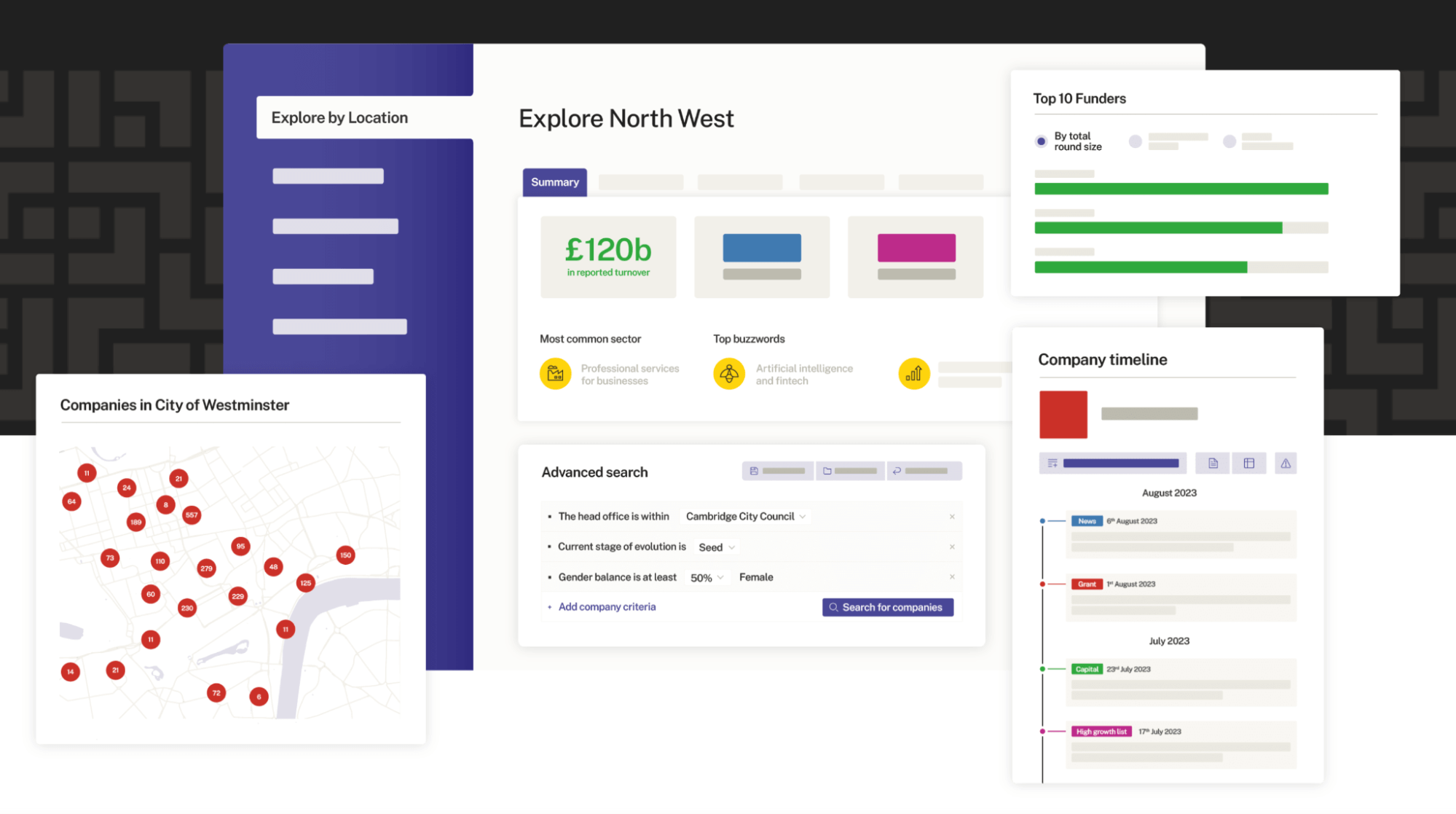
We blend data from a range of government and third-party sources, including exclusive data partnerships, HMRC, censuses, patent registries, and the media. We then make this information searchable and actionable; cleaning and enriching the data to give you complete company profiles and an up-to-date overview of what’s happening in your local economy.
For instance, Lancashire County Council finds and supports scaleups with Beauhurst. The Council uses Beauhurst’s advanced filters to identify growing businesses in Lancashire, so they can be fully informed about individual companies and trends in the local economy before they schedule their meetings.
Amin Vapari, Business Finance & Scaleup Lead, said “With Beauhurst, we have access to real-time information, with a level of detail that we wouldn’t get anywhere else.”
The Council benefits from a detailed oversight of the companies they work with, with information about corporate structure, employee count, and revenue, as well as grants and funding. With this at their fingertips, the Council can reach out to businesses with more credibility.
Accurate business classifications to reflect the latest innovations
Many company search options, including tools like Endole, base their databases’ search functionality on Standard Industrial Classification (SIC) codes, which describe the different industries a business can operate within. But these codes were last updated in 2003, meaning they’re not a helpful or accurate way of categorising businesses in new, high-growth sectors like fintech and AI.
When SIC codes are the main way of narrowing your search and understanding the results, you risk missing out on new opportunities because potential partners aren’t included in the search results. For example, all software companies are still classified by the SIC code 62012—business and domestic software development—regardless of whether the product is a mobile app, a SaaS solution, or a server software provider. What’s more, some companies that don’t fit neatly into one category are classified as “other” or “not-elsewhere-classified” (n.e.c.), which means they could be omitted if you’re searching by SIC code alone.
In contrast, Beauhurt’s filters make it easy and intuitive to narrow your search to the subsections of modern industry. By adding keywords and buzzwords—including terms like wearables, femtech, eHealth, crypto-currencies, and 3D printing—as a filter, you can return results that are far more relevant and accurate than traditional industry classifications.
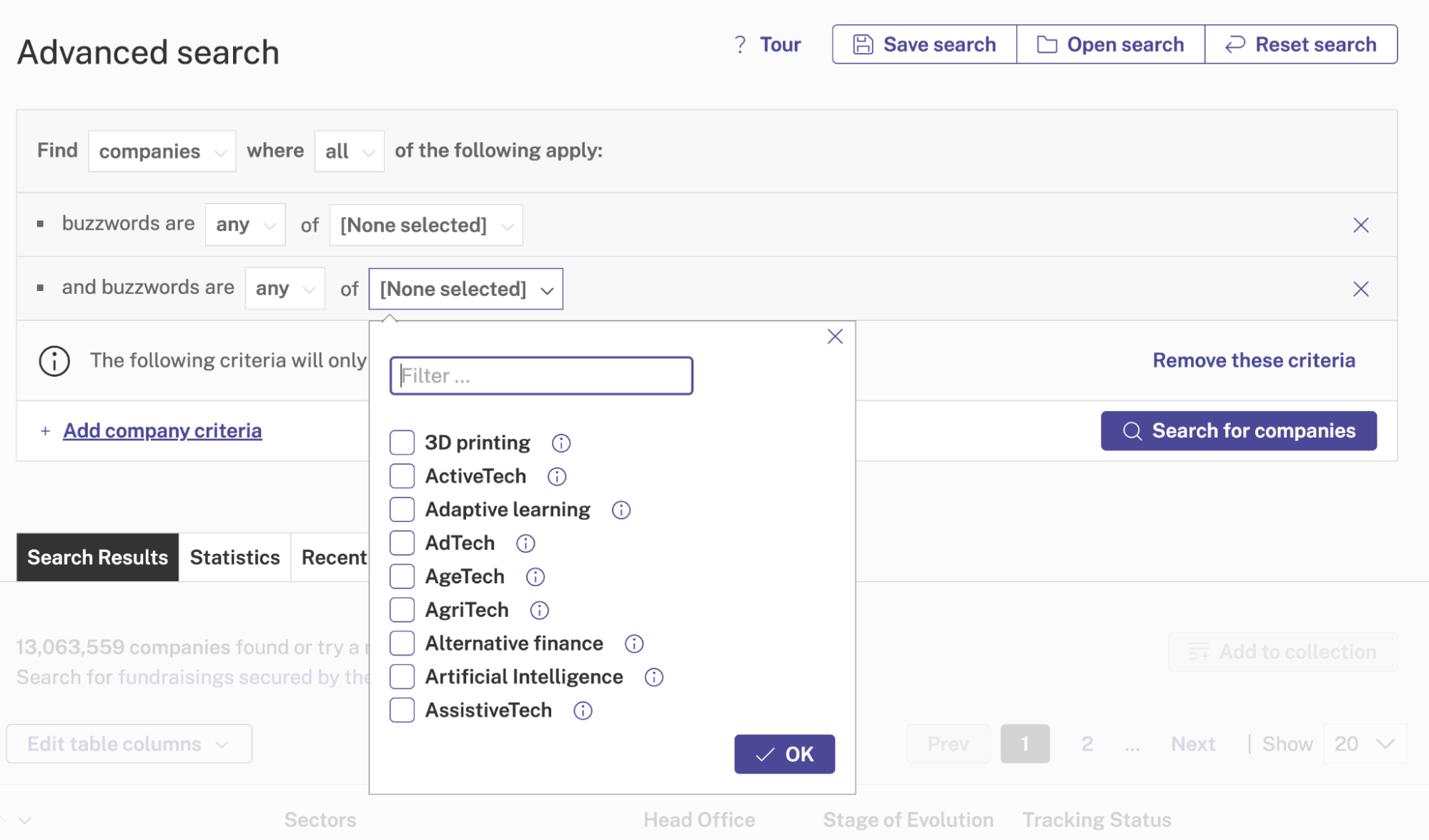
For example, Satellite Applications Catapult uses Beauhurst for its analysts and consultants to support the brand-new UK space technology sector and help its clients scale to their full potential. They search for ways to encourage growth in both jobs and revenue and facilitate collaboration between SMEs and corporates.
Chris Hobs, Head of Business Strategy, said “At the moment, we predominantly use Beauhurst as a due diligence tool, to get an understanding of clients’ financial and technical standing, as well as their position in the wider market.” He points out that if a client says they received funding, his company uses Beauhurst to verify how much, who was involved, and the valuation of the company now. This protects their business from some of the potential risks of a new collaboration and helps them to plan strategically. Being able to complete these searches quickly, thoroughly, and in one place is another massive benefit too.
Useful data you can understand, compare, and apply
Most UK company searches return PDF or CSV files that you need to download and scan for the information that matters. To get a usable picture of how a company operates, how it competes within its industry, and its credentials, you might even have to download multiple files from separate sites and cross-reference them with your own manual research.
Even paid-for company search platforms often give you the option of downloading reports, but not browsing the data on a dashboard. This process is time-consuming and error-prone, with a lot of heavy lifting—making it extremely difficult to extrapolate the finer company details that give you a sense of the risks and opportunities a new partnership might offer.
In contrast, Beauhurst’s advanced search filters make it easy to find and compare any current or past UK business, using one unparalleled database.
We present the data within your dashboard in a way that’s easy to interpret, monitor, and apply. Our team of more than 60 data scientists clean and curate our data, assisted by machine learning to compile and enrich information from live sources.
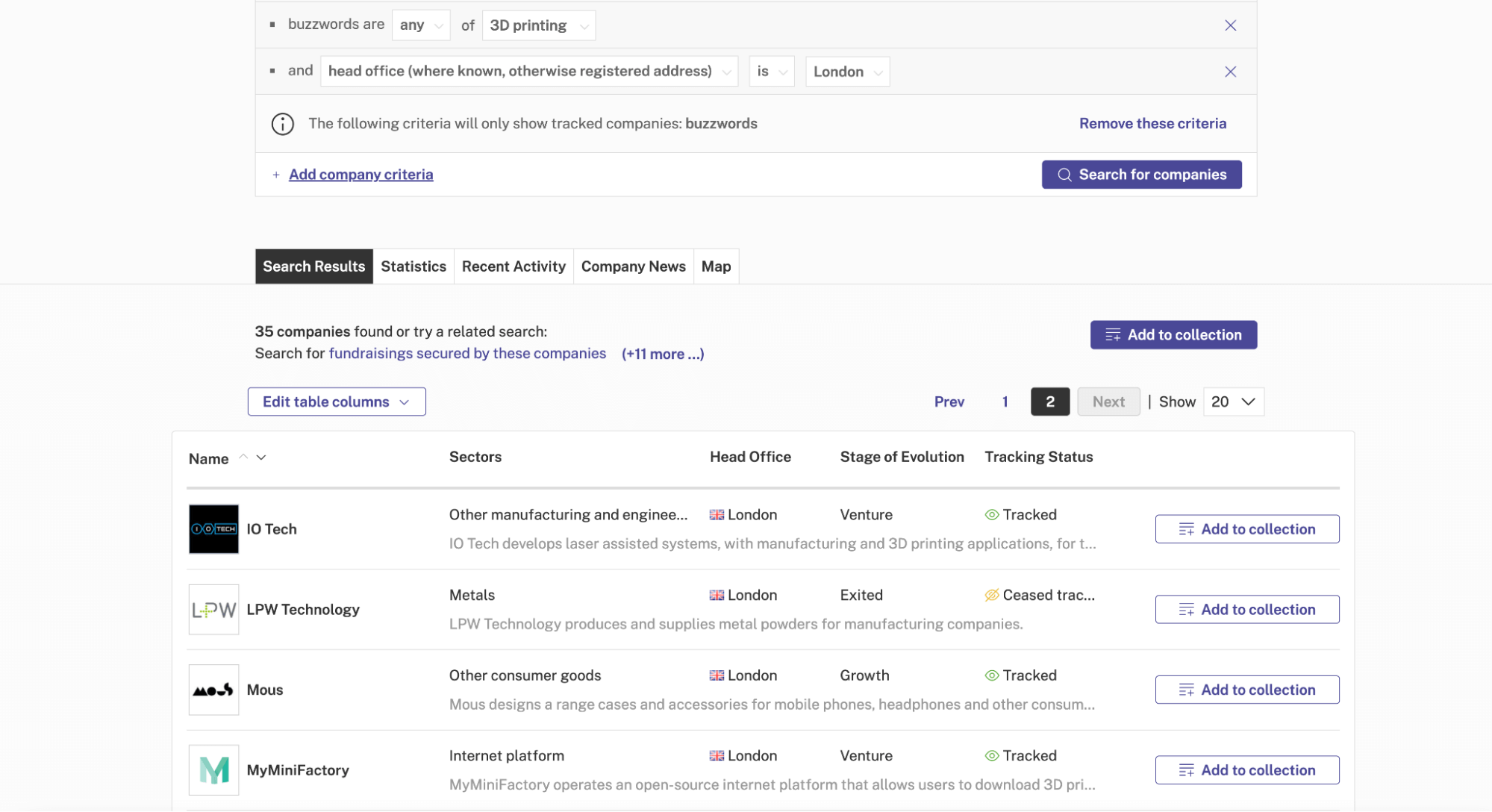
With Beauhurst, the searches you perform return the information you actually want. And if you spot something in a company (or individual) that doesn’t work for you, you can keep refining your search to find better alternatives with similar criteria.
To keep track of developments in your area or industry, you can set up your own “Collection” of people or companies, and use the Beauhurst dashboard to automatically monitor the latest updates and status changes with any or all of them. You then get notified of all the news.
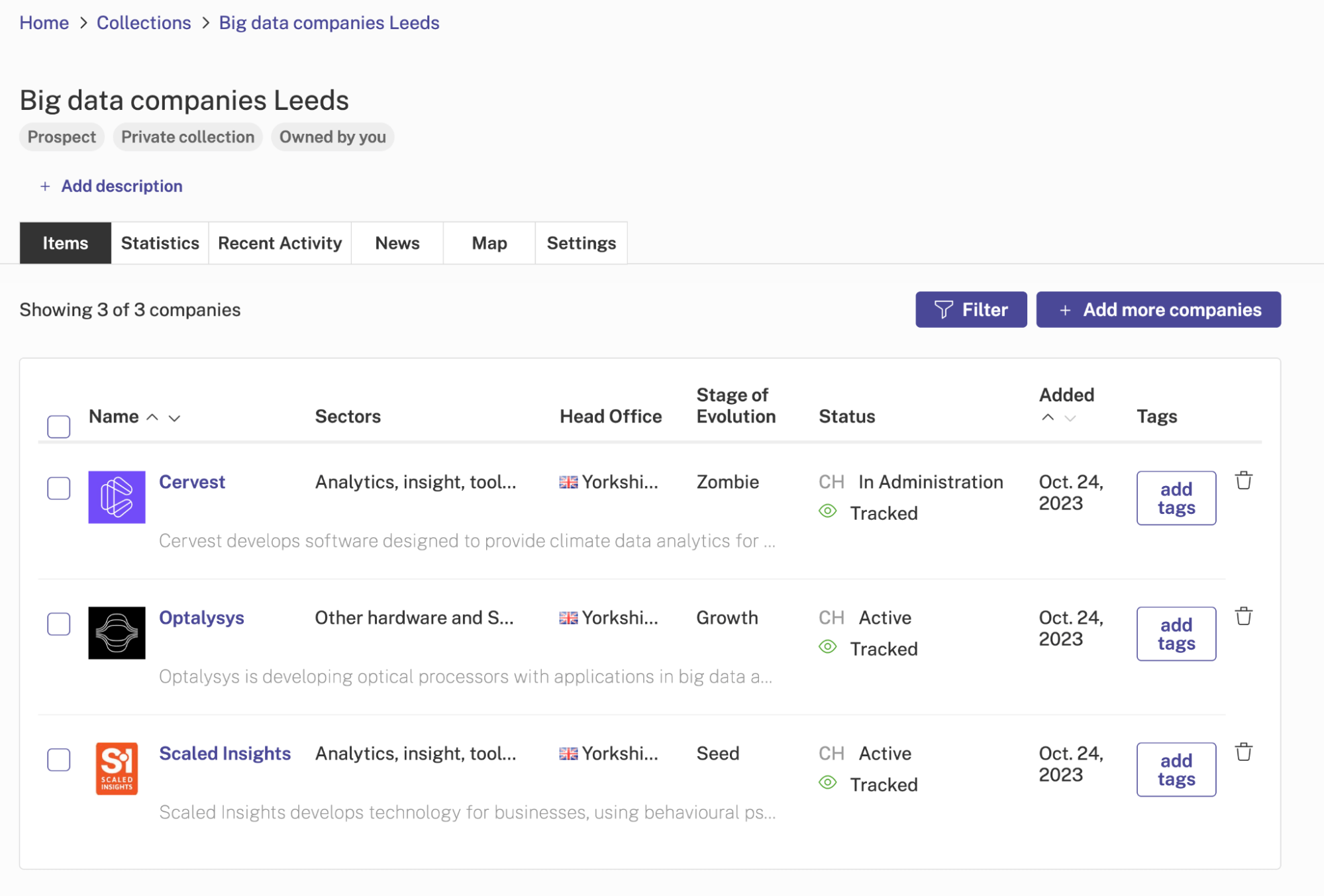
For instance, Coventry & Warwickshire Growth Hub uses Beauhurst’s search filters and Collection function in their efforts to help local businesses, such as by providing grants or helping businesses to network with specialists who can address gaps in their skills or staffing.
The quantity and quality of Beauhurst’s company data helps the Growth Hub to stand out from the competition and stay up to date. Jon Bass, Finance Specialist, said “I have Collections set up for each area in Coventry and Warwickshire, so that I can easily identify target companies for us to work with. And I can quickly narrow down these lists, for example by headcount, if I only want to look at companies with fewer than 250 employees.” He gets weekly notifications on changes in the local area, including flagging CVLs (creditors’ voluntary liquidations), insolvency, or businesses receiving funding.
Six highly-specific company searches you can do with Beauhurst
Beauhurst’s database is unique—not just because of the breadth and depth of UK company information we’ve collected, but also because of how easy it is to find the data that’s relevant to your needs. Our intuitive, advanced search options give you the data you need to act confidently and efficiently, and our search results are presented in a user-friendly dashboard that’s easy to interpret and reflective of the modern business landscape.
Here are six searches you can do on our platforms:
1. Financial history
Beauhurst’s database returns the most accurate and up-to-date financial information, including verified data on every milestone in a company’s financial history.
Start by searching for a company and opening the “Summary” page, where you’ll already see the helpful business timeline and the headline statistics for the business.

Then, the “Financials” tab will give you year-on-year information on the company’s finances, including:
- Turnover and EBITDA
- Operating profit
- Total assets, net assets, cash, and liabilities
- Credit report

Unlike many other company search options, which only return spreadsheets for you to download, our dashboard makes it easy to understand key information from company documents like balance sheets and financial statements. We structure the info to make it easy to see the way a company is doing financially over time—all within the same dashboard.
You can also use the database to search a company’s investments and equity fundraising in granular detail (even rounds that weren’t announced to the media).
By clicking the key funding events on the financial timeline, you can verify the investment a business received and get detailed information on who the investors were and how the cash affected the value of the company and the way it operates.
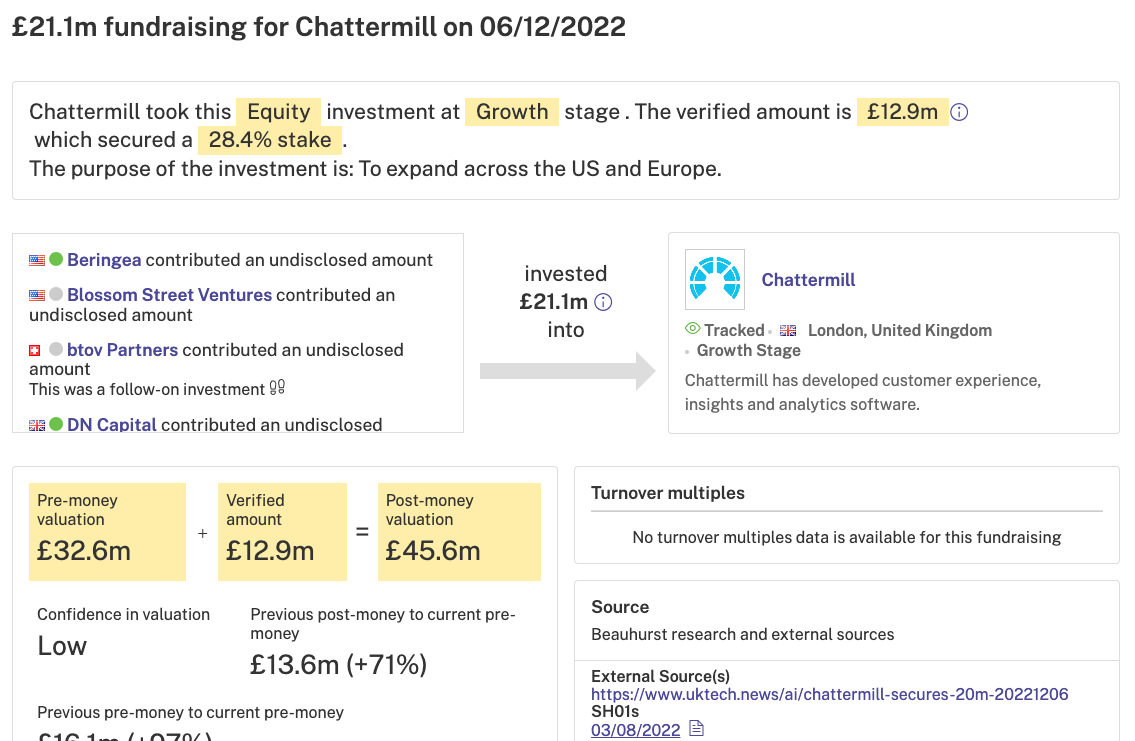
2. Business history and development stage
Beauhurst’s database also includes information about the lifecycle of 13m UK companies, so you can find out at a glance whether a business is at seed, venture, growth, or established stage. If you want to know the company formation date or when it became a limited company, you can use the timeline to find the information in seconds.
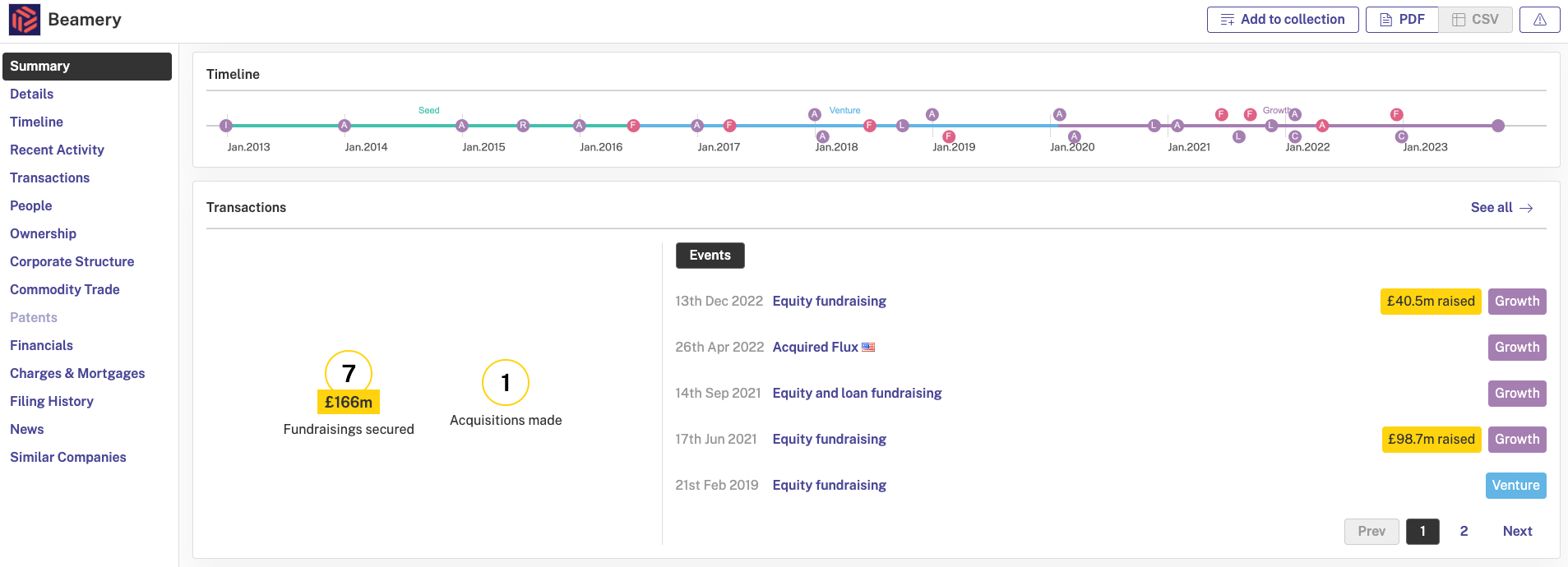
As well as searching and verifying key business events, you can also use Beauhurst’s filters to find out how many businesses are at a certain development stage in your area. When you need an overview of the trends or the competition, this information is a way of zooming out and informing your business decisions.
For example, you can use a Beauhurst advanced search to look for local companies at each stage of their evolution, and narrow the results by company type.
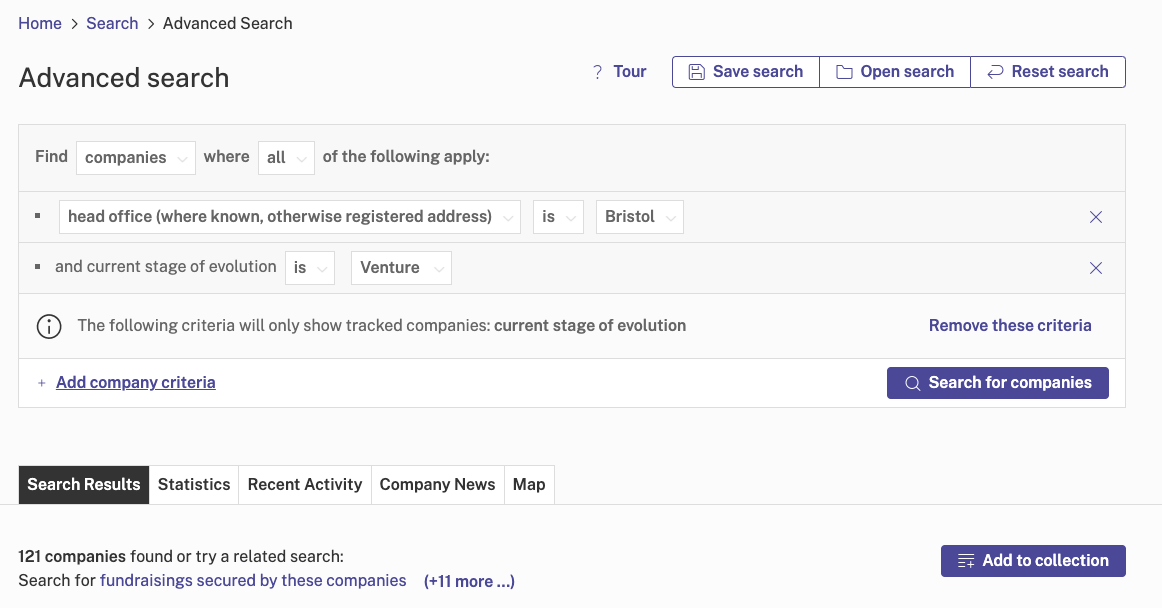
As well as returning a list of, for example, the 121 companies in Bristol at venture stage, we break down the results to help you understand which industries these businesses are operating within. You can use this information to condense the list of companies you want to contact, or to get a sense of which sectors are growing or declining near you.
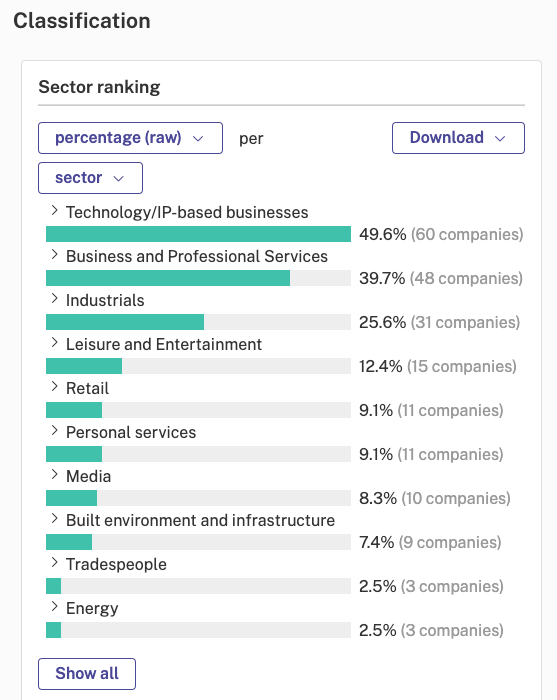
As well as giving you an introduction to potential projects to invest in, this information is useful for organisations who work in the public sector—for example, local government departments use this feature to forecast the future needs of their area.
One very simple illustration: search results that return a high number of new businesses in a local area are a good sign of stability in the job market, and perhaps indicate the need to invest in more infrastructure. However, if your search shows that a high number of businesses have recently become inactive, that might indicate the need to plan for higher unemployment rates and increase support to businesses that are struggling.
3. Key business events
You can also use Beauhurst’s database to learn more about the origins and history of a business by searching for the key events in its history.
For example, this is how Beauhurst tracks the key events of an academic spinout originally incorporated in 2016:
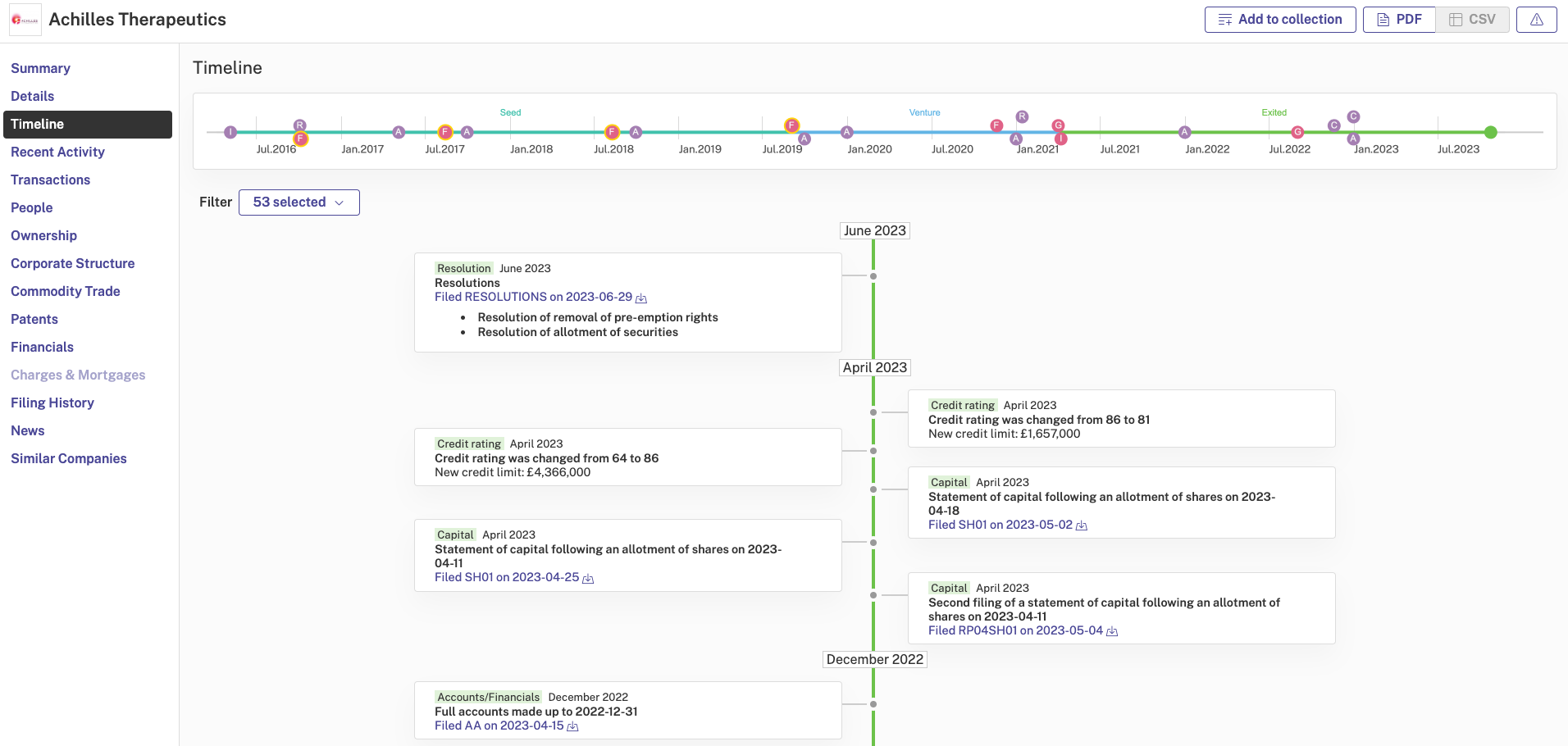
From the timeline, you can access verified information (including supporting documents) on key events such as accounts filed, management buyouts or buy-ins, acquisitions and grants, and find out exactly when the business moved to a new stage of growth.
To discover new companies that meet your criteria, you can also search by “Significant Event” in an advanced search. For example, you’ll be able to search by date for businesses that have:
- Acquired or been acquired by another company
- Undergone an MBO or MBI
- Held an IPO
- Been spun out of a company, or spun out a new company of their own, including from academic institutions
- Attended an accelerator
- Appeared in a news story
- Featured in a high-growth list
- Had a patent granted
- Created a charge or mortgage
- Incorporated, including the date of incorporation
- Ceased trading
For many of these search filters, you can also add additional criteria to ensure that you only see results you can use. For example, instead of searching for every organisation that has recently spun out a new company, you can narrow the search so it only includes companies that spun out at the growth stage of their evolution, and where the spun-out company has a credit rating of the value of your choice.
4. Patent history
Unlike many other company search options, Beauhurst’s database includes information on patent history, including:
- The number of patents a business holds
- The classification of the patent (for example, human necessities, transporting, chemistry, textiles, or mechanical engineering)
- The country or countries where the patent was filed
- Links to the full details of the patent on an external website

You can use this information when you’re performing due diligence, for example, to substantiate the claims a company makes before you invest in their new product. Searching for patent holders is also useful when you want to get a sense of which companies are generating new ideas in your area or industry.
5. People
As well as holding information on private companies, Beauhurst connects key individuals with the companies they’re associated with. We go beyond the standard company data on directors to include the whole ownership structure and shareholders, including information on their percentage stake in the company and its estimated worth.
You can also use the results of these searches to find out more about the individuals involved by scanning their profiles. These profiles include vital details about their network and time with their previous companies, as well as their contact details:
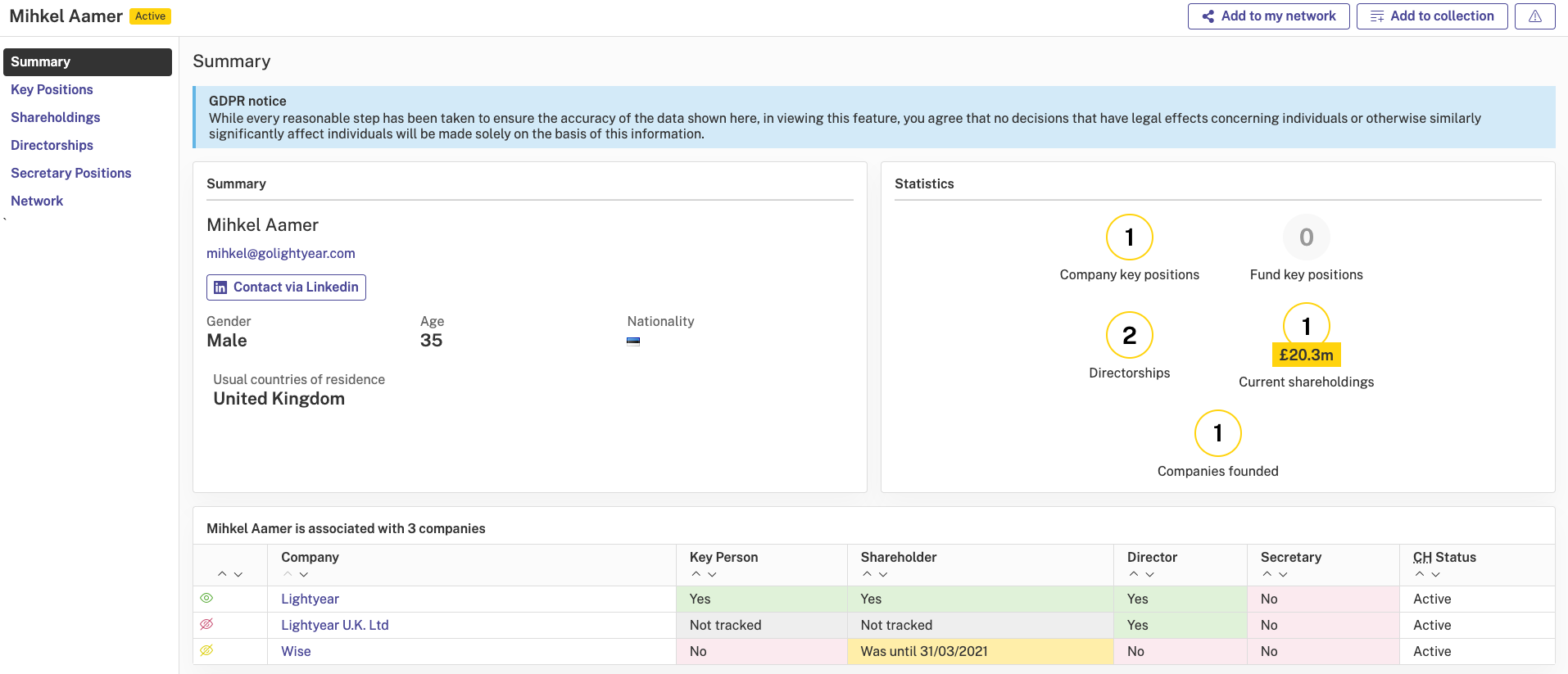
Once you’ve used search filters to find relevant companies, this feature makes it easy to contact a highly-targeted list of the key players in your industry.
Important note: Beauhurst platforms aren’t just designed for scraping email addresses and LinkedIn profiles for cold outreach. If that’s what you’re looking for, this isn’t the solution for you.
You can also do an advanced search to get data about a company’s employment practices, including information on headcount, gender distribution of employees, and pay discrepancies.
For example, if you wanted to network with—or provide a grant to—a female-led business where the company director is under 30 years old, you can filter the results of a “People” search by gender, shareholdings, and age. By adding an industry buzzword such as “edtech,” you’ll return a list of eligible people you can then reach out to.
See below for an illustration of this search:
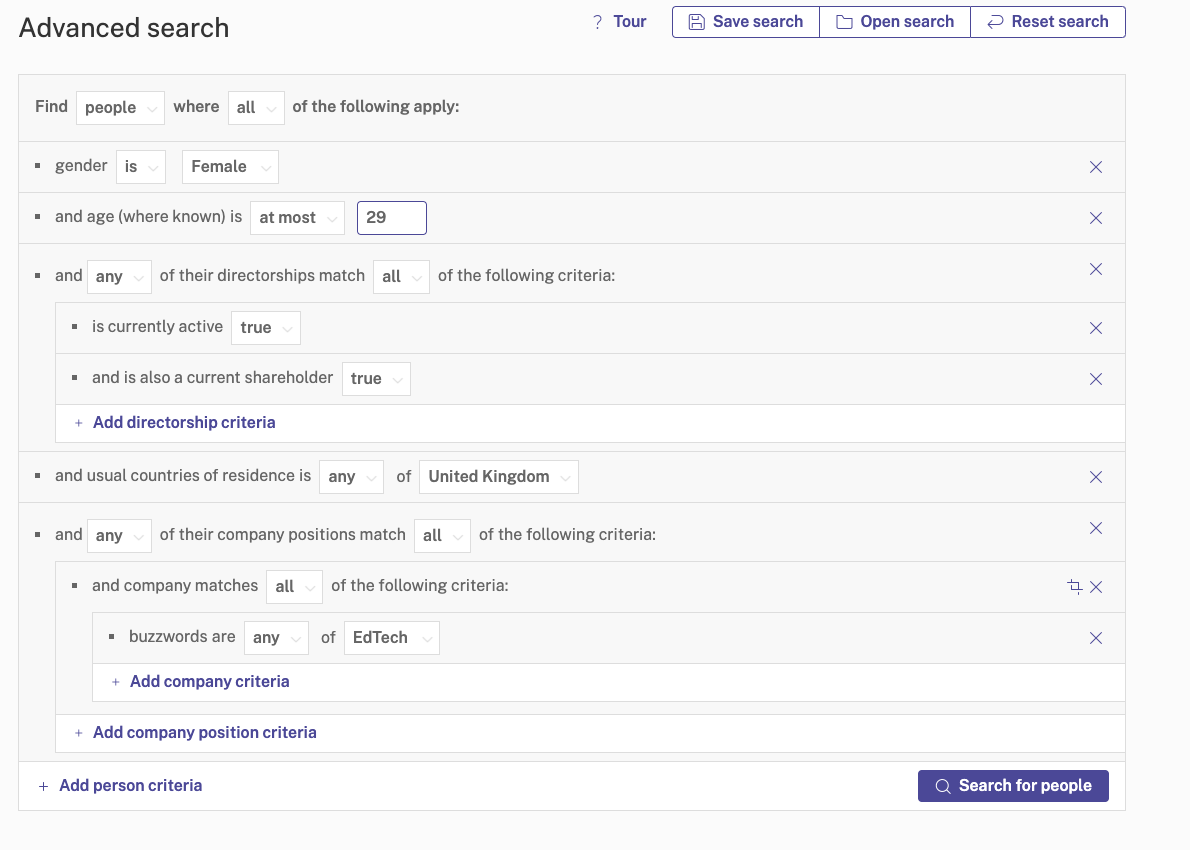
This search returns seven relevant results, an at-a-glance summary of their company and the net worth of their shareholdings, so you can decide who to reach out to or add them to a collection to keep up to date with the latest developments in their companies.
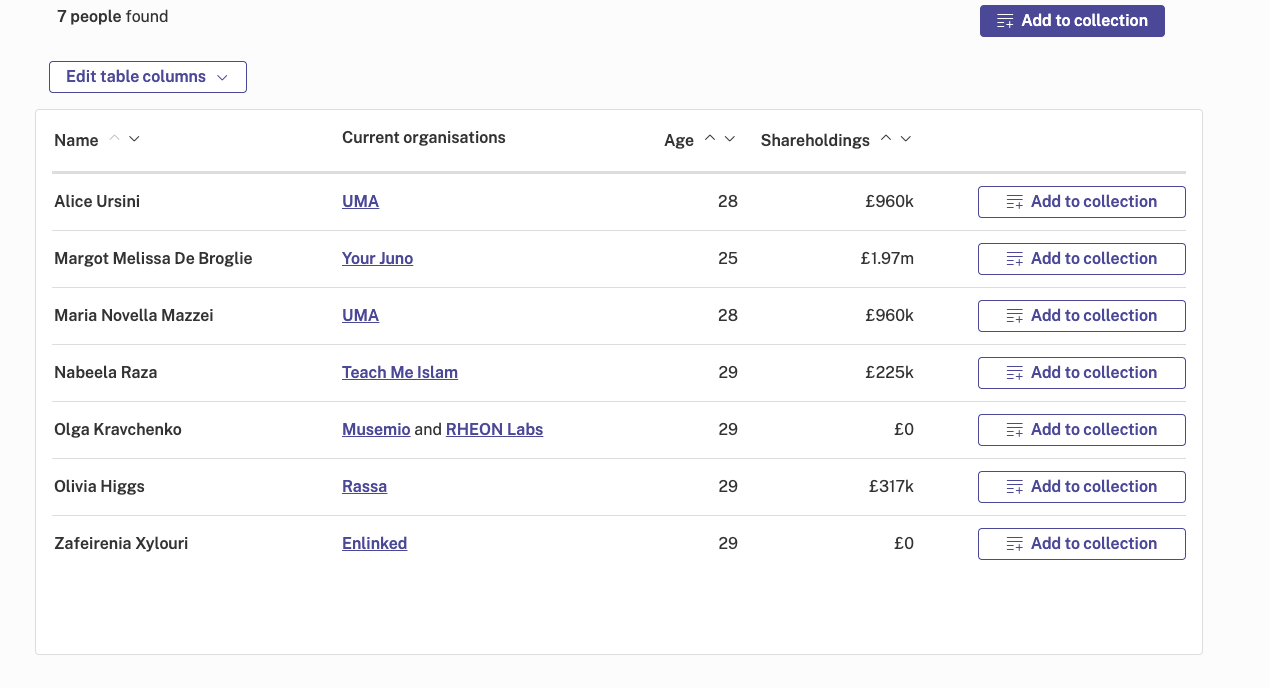
6. Headquarters
Most company search tools, including Companies House, will show you where a company has its registered address. In contrast, Beauhurst gives you a deeper understanding of where a company actually operates—its service address—so you can connect with the companies that are investing and growing in your area.
For example, under the “Details” tab in a company’s summary, you can view both a company’s registered office address and its head office location. These are often different. A company might be registered in London, but deploy its team in the north of England. When you use our advanced search to find new businesses, we search location by head office whenever possible, giving you an accurate picture of the businesses operating near you.
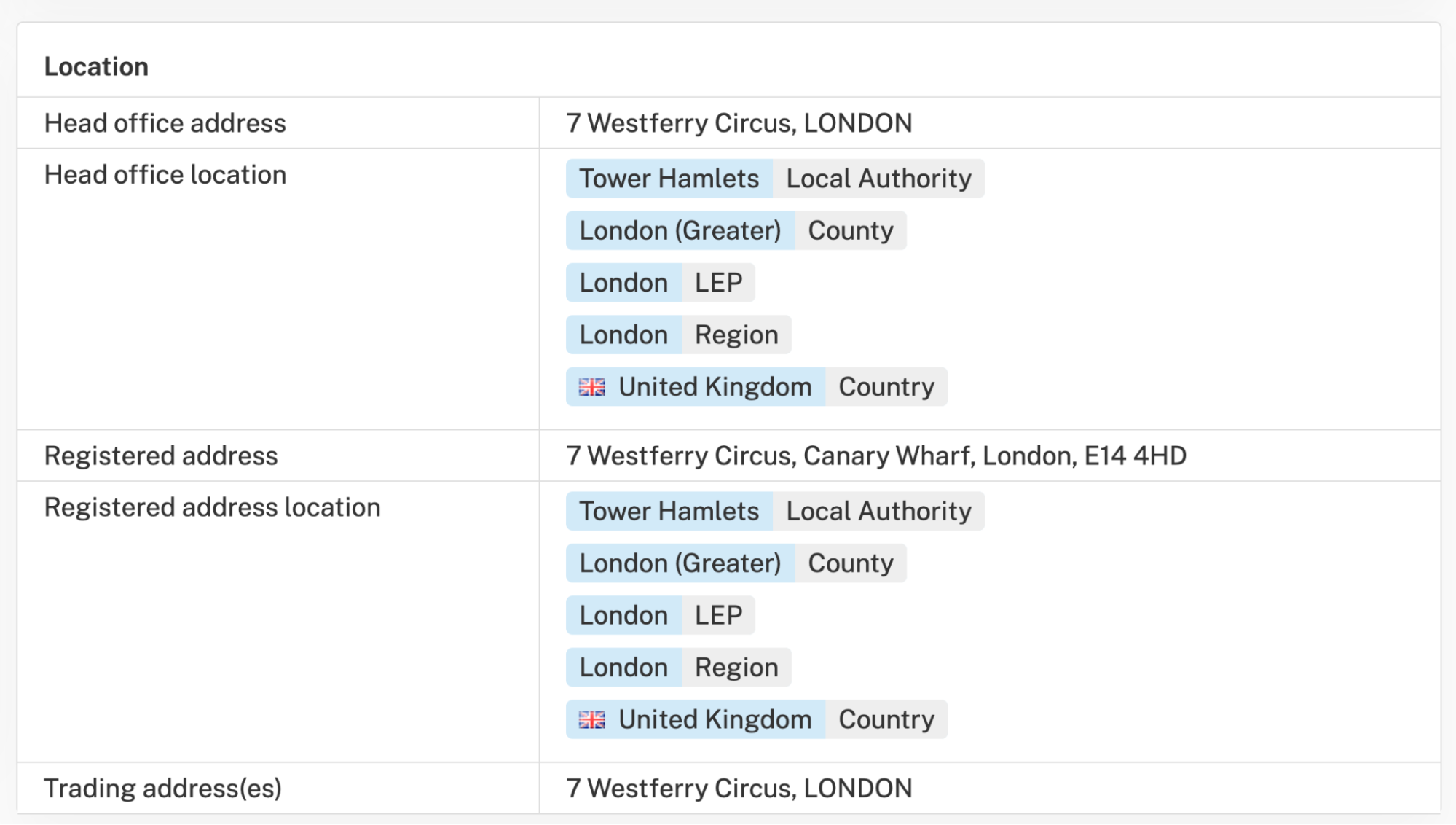
This is just a small sample of the types of data you can discover when you work with Beauhurst. Our advanced search filters can also show you:
- How an organisation fits into a corporate structure
- The market a company is targeting
- The extent of a company’s online presence and the technology that powers their website
- News articles which mentioned the company, when they were published, and why
- COVID filters that continue to monitor the impact of the pandemic on a company, including the claims a company made on, for example, job retention schemes
By overlapping the filters you choose, you can zero in on the most attractive prospects, saving you time and energy while still ensuring that you act on the most accurate and up-to-date information available on every UK company.
Search the deepest, most accurate UK private company database
With Beauhurst’s platforms, you can use advanced company search filters to draw on up-to-date, verified information that local government bodies, LEPs and universities, investors and accelerators, financial and professional services, and sales teams need.
Compared to business registers like Companies House and other third-party tools, Beauhurst offers you a thorough, reliable search of the most current and relevant information about more than 13m UK companies. And you can use Beauhurst’s database not only to discover a company’s financial and business history, but also its most influential people, its intellectual property, and the places where its activities make an impact.
Beauhurst’s data scientists clean and extract the data you need, so it’s easy to apply the info you learn about companies and the ecosystem they’re working within. Our database has the breadth, depth, quantity, and quality of information you need to make informed decisions.
Book a demo to speak to an expert and find out how Beauhurst can work for you.
Grow your business.
Get access to unrivalled data on all the companies you need to know about, so you can approach the right leads, at the right time.
Book a demo today to see all of the key features of our platforms, as well as the depth and breadth of data available.
An associate will work with you to build a sophisticated search, returning a dynamic list of organisations that match your ideal customer profile.
Beauhurst Privacy Policy